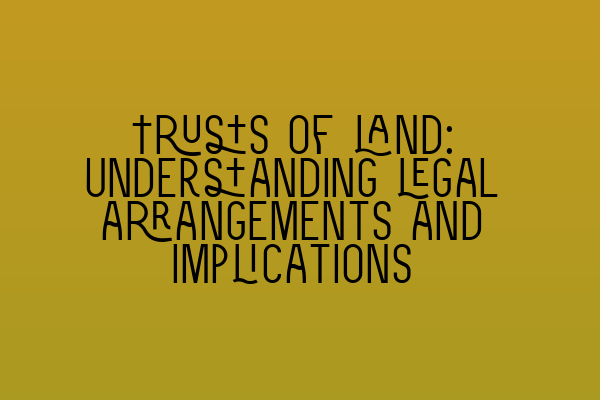Trusts of Land: Understanding Legal Arrangements and Implications
When it comes to property law, one concept that often arises is the trust of land. Trusts of land can have various legal arrangements and implications, making it crucial for property owners and investors to have a solid understanding of this aspect of the law. In this article, we will explore the ins and outs of trusts of land, including their definition, types, key elements, and the potential consequences they can have on property transactions and ownership.
What is a Trust of Land?
A trust of land is a legal arrangement where a property is held by one person (the legal owner) for the benefit of another person (the beneficiary). This arrangement involves a separation of legal ownership and beneficial ownership, giving rise to specific rights and responsibilities for each party involved.
Trusts of land can be created through various means, such as express trust, resulting trust, or constructive trust. An express trust is intentionally created through a formal legal document, while resulting trusts arise when a property owner transfers ownership but fails to specify the beneficiary. Constructive trusts, on the other hand, are imposed by the court to prevent unfair outcomes or enforce equitable principles.
Types of Trusts of Land
There are two main types of trusts of land: bare trusts and beneficial trusts.
Bare Trusts
In a bare trust, the legal owner holds the property on behalf of the beneficiary without any obligations or decision-making power. The beneficiary has absolute entitlement to both the capital and income generated by the property. Bare trusts are often used for straightforward property transactions, such as parents buying a property for their children.
To delve deeper into the subject of trusts, you may refer to our comprehensive guide on Legal Challenges in Property Transactions.
Beneficial Trusts
In a beneficial trust, the legal owner holds the property on behalf of the beneficiary but retains certain powers and responsibilities regarding the property. Beneficiaries have an equitable interest in the property, meaning they are entitled to both income and capital but do not have immediate access to the property. Beneficial trusts are commonly used to protect the interests of vulnerable individuals or manage complex property ownership structures.
It’s essential to avoid common pitfalls and misconceptions when dealing with property law. To gain a deeper understanding, you may refer to our article on Avoiding Common Pitfalls in Property Law.
Key Elements of a Trust of Land
For a trust of land to be valid and enforceable, certain key elements must be present:
- Legal owner: The person or entity registered as the legal owner of the property.
- Beneficiary: The person or persons who have a beneficial interest in the property.
- Trustee: The person or entity holding legal ownership on behalf of the beneficiary.
- Trust property: The property subject to the trust.
It’s important to carefully consider the implications and legalities surrounding trusts of land, especially when engaging in property transactions or ownership arrangements. Being well-prepared is crucial to avoid unnecessary complications or legal disputes.
Implications of Trusts of Land
Trusts of land can have various implications on property transactions and ownership. Some important considerations include:
- Legal obligations: The legal owner must act in the best interests of the beneficiary and fulfill their fiduciary duties.
- Rights and responsibilities: Beneficial owners have certain rights, such as the right to income and a share of the capital, but may not have absolute control over the property.
- Disputes and litigation: Trusts of land can lead to disputes between legal owners and beneficiaries, potentially resulting in litigation or court intervention.
- Succession planning: Trusts of land can be utilized for estate planning purposes, enabling individuals to pass on property to future generations while maintaining control and providing for beneficiaries.
Property transactions and ownership arrangements involve various legal considerations, including mortgages, environmental ethics, and more. Explore our related articles to gain a comprehensive understanding:
- Mortgages and Land Law: Essential Considerations for Property Transactions
- Environmental Ethics in Land Law: Balancing Development and Sustainability
- Land Law Revision Tips: Ace Your Exam Preparation
Understanding trusts of land is crucial for property owners and investors alike. By comprehending the legal arrangements and implications, individuals can make informed decisions, protect their interests, and navigate property transactions with confidence.
